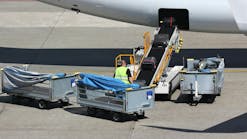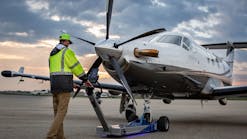CHICAGO--(BUSINESS WIRE)--Sept. 15, 2005--Fitch believes that the voluntary filing by Northwest Airlines, Inc. (Northwest, or the airline) for reorganization under Chapter 11 of the U.S. Bankruptcy Code poses only minor immediate risks to most general airport revenue bonds. However, credit concerns at individual airports, in particular at facilities where Northwest operates major connecting hubs, including Minneapolis-St. Paul International Airport, Detroit Metropolitan Wayne County Airport, and Memphis International Airport, may increase during the course of the airline's bankruptcy proceedings should the reorganization lead to operating decisions that significantly reduce its schedule. Reflecting the risks inherent in the bankruptcy process, Fitch revises its Rating Outlooks to Negative from Stable on the following bonds:
-- Minneapolis-St. Paul Metropolitan Airports Commission, Minnesota's approximately $942 million senior lien airport revenue bonds, rating affirmed at 'AA-', and approximately $848 million junior lien airport revenue bonds, rating affirmed at 'A', issued for projects at Minneapolis-St. Paul International Airport;
-- Wayne County Airport Authority, Michigan's approximately $2.2 billion airport revenue bonds, rating affirmed at 'A', and approximately $89.2 million junior lien revenue bonds, rating affirmed at 'A-', issued for projects at Detroit Metropolitan Wayne County Airport.
In addition, Fitch maintains a Negative Rating Outlook for Memphis and Shelby County Airport Authority, Tennessee's approximately $600 million airport revenue bonds rated 'A+', issued for projects at Memphis International Airport.
As is common in the early stages of the bankruptcy process, Northwest continues to operate its full schedule and will need to fulfill its obligations of its use and lease agreements at the various airports where it operates, though there may be some small amounts of prepetition rents owed. As bankruptcy courts generally allow an airline to continue making payments to the airports it serves, Fitch expects airports will continue to receive payments from Northwest on a timely basis for the near term.
The risks to individual airport finances may increase over the course of the bankruptcy process as Northwest undertakes a reorganization that may result in considerable operational changes. Particularly vulnerable are Northwest's hub airports, which rely on the scheduling decisions of the airline to generate significant levels of transfer traffic to complement local origin and destination (O&D) traffic.
Northwest and its regional affiliates accounted for 80% of total enplanements at Minneapolis-St. Paul International Airport in 2004. Transfer traffic accounted for 55% of the airport's total enplanements for the year, the majority of which is generated by Northwest. The airport holds approximately $67 million of unrestricted cash to support its operations.
At Detroit Metropolitan, Northwest and its affiliates represented 79% of total enplanements in 2004, with transfer traffic accounting for 56% of total passenger volume. The airport holds $82.8 million of unrestricted cash, with access to another $15 million on an open line of credit, to support operations. Both Minneapolis and Detroit serve established business markets; origination traffic other airlines would likely act to capture should Northwest significantly alter its operations. However, other carriers may be slow to replace any lost connecting traffic due to their own operating needs and financial condition.
Northwest and its affiliates represented 81.4% of total enplanements at Memphis International in 2004, with the airline's hubbing activity resulting in connecting traffic accounting for 55.4% of total passenger volume. Again, the airport's attractive local market will likely attract other carriers to serve originating passengers, but as Northwest's third hub, the bankruptcy may put the airport's connecting traffic at risk. The large presence of FedEx at the airport somewhat mitigates the potential financial ramifications of a significant reduction of Northwest's service at Memphis International.
At somewhat less risk are airports served by Northwest that rely on local demand for air travel to drive their operations; however, some smaller cities with unprofitable route characteristics may lose service. Also, the bankruptcy may call into question Northwest's 'Heartland Strategy,' under which the airline has increased point-to-point service from airports such as Indianapolis International (airport revenue bonds rated 'A+' by Fitch).
In addition to the general airport revenue bonds at airports served by Northwest, the bankruptcy filing presents implications for holders of the airline's special facility debt. The structure and security of special facility transactions vary considerably, from a simple guarantee of the airline, in which case the investor's claim ranks behind secured creditors with limited chance for recovery, to more secured structures, such as mortgage or leases, which may provide the investor with a greater likelihood of recouping their investment. Fitch does not rate any of Northwest's outstanding special facility debt.
Fitch will issue credit updates on the airports mentioned, as well as any other facilities, as warranted by events during Northwest's bankruptcy proceedings.
Fitch's rating definitions and the terms of use of such ratings are available on the agency's public site, www.fitchratings.com. Published ratings, criteria and methodologies are available from this site, at all times. Fitch's code of conduct, confidentiality, conflicts of interest, affiliate firewall, compliance and other relevant policies and procedures are also available from the 'Code of Conduct' section of this site.
CONTACT: Fitch Ratings Peter Stettler, 312-368-3176 (Chicago) Corey Modeste, 212-908-0399 (New York) Douglas Kilcommons, 212-908-0740 (New York) Jessica Soltz Rudd, 415-732-5616 (San Francisco) Christine Pollak, 212-908-0526 (New York, Media Relations) KEYWORD: MINNESOTA MICHIGAN NEW YORKINDUSTRY KEYWORD: TRAVEL BANKING AIRLINES TRANSPORTATION BOND/STOCK RATINGSSOURCE: Fitch Ratings




